espionage
Canada’s security agency confirms Chinese agents worked directly to elect MPs
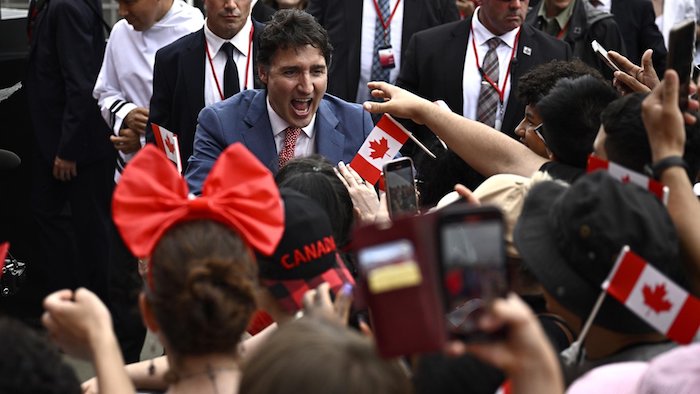
From LifeSiteNews
Canadian Security Intelligence Service (CSIS) director David Vigneault testified to the ongoing Foreign Interference Commission that he supports the ‘conclusions’ that Communist China was working to help elect regime-friendly Canadian MPs.
During testimony last week at the inquiry looking into alleged meddling in Canada’s last two federal elections, the head of the nation’s intelligence agency confirmed that agents of the Chinese Communist Party (CCP) did help to elect “pro-China” candidates, also disclosing the existence of a large cash payments scheme totaling $250,000.
David Vigneault, who serves as the Canadian Security Intelligence Service (CSIS) director, told the inquiry, titled the Foreign Interference Commission, that he supports the “conclusions” that the CCP was working to help elect China-friendly Canadian MPs.
“I support those conclusions,” he said after pointing out documents that show large cash payments to unnamed public office holders.
“These words have been crafted very carefully,” he said, adding, “For the Commission record I support those conclusions. I would not want to go further.”
The Foreign Interference Commission was convened to “examine and assess the interference by China, Russia, and other foreign states or non-state actors, including any potential impacts, to confirm the integrity of, and any impacts on, the 43rd and 44th general elections (2019 and 2021 elections) at the national and electoral district levels.”
The Commission is being headed by Justice Marie-Josée Hogue, who had earlier said that she and her lawyers will remain “impartial” and will not be influenced by politics and began on January 29.
In January, Hogue said that she would “uncover the truth whatever it may be.”
The CSIS director’s comments came as a result of an internal federal memo, the After Action Report 2021 Federal Election, which noted how “The People’s Republic of China sought to clandestinely and deceptively influence Canada’s 2021 federal election.”
The memo, dated December 17, 2021, reads that the “foreign influence was pragmatic in nature and focused primarily on supporting individuals viewed to be either ‘pro-PRC’ or ‘neutral’ on issues of interest to the People’s Republic of China government and Chinese Communist Party.”
The document was put together by the Security and Intelligence Threats to Elections Task Force.
“The Task Force also observed online media activities aimed at discouraging Canadians particularly of Chinese heritage from supporting the Conservative Party of Canada, Party leader Erin O’Toole and particularly former Steveston-Richmond East candidate Kenny Chiu,” reads the Action Report.
Counsel for Conservative MP Michael Chong asked Vigneault during the Commission hearings if CSIS agreed with the Action Report.
“I recognize this information,” said Vigneault in reply.
Thus far, the testimony at the Commission has revealed that former Conservative Party of Canada (CPC) MP Kenny Chiu said he felt “betrayed” by the federal government after only now learning he was the target of agents of the CCP.
Also, the public has learned via the inquiry from Chief Electoral Officer Stéphane Perrault that he was secretly warned by security agents of irregularities in the 2019 election.
‘Politically-Connected Canadian’ linked to cash payments of $250,000 to influence 2019 election
Last week, the Commission released a CSIS report titled People’s Republic Of China: Threat Actors, Contact With Candidates And Funding Of Threat Actors, which documents the large cash payments of “$250,000 from People’s Republic of China officials in Canada possibly for foreign influence-related purposes.”
“Prior to and during the 43rd general election in 2019 a group of known and suspected People’s Republic of China related threat actors in Canada including PRC officials worked in loose coordination with one another to covertly advance PRC interests through Canadian democratic institutions,” wrote the agency in the report.
The report lists that 11 political candidates as well as 13 political staff members were “assessed to be either implicated in or impacted by this group of threat actors,” and that “some of these threat actors received financial support from the People’s Republic of China.”
“For example, there likely were at least two transfers of funds approximating $250,000 from People’s Republic of China officials in Canada possibly for foreign influence-related purposes though most likely not in an attempt to covertly fund the 11 candidates,” the report reads.
“These were transferred via multiple individuals to obfuscate their origins via an influential community leader, to the staff member of a 2019 federal election candidate and then to an Ontario MPP. The transfers reportedly took place in late 2018, early 2019.”
Vigneault confirmed last Thursday that the reports were accurate, saying about them, “That is a correct statement,” but added the agency is not able to “discuss classified information.”
As for the unnamed “Politically-Connected Canadian,” Vigneault said that he would “not have any specific comment about political matters as you can imagine.”
The Commission also included an In Camera Examination Summary in which CSIS discussed “possible People’s Republic of China interference” which took place at the 2019 Liberal Party nomination, which was won by MP Han Dong.
Another document showed that there was a “potential foreign interference by a politically connected Canadian” in 2019, however, this person was not named.
The summary said that this person had “not previously been identified as acting on behalf of a foreign state but appeared to have been doing so in the period leading up to the 2019 election.”
“The report initially assessed it likely the actor ‘has already had an impact on the 2019 federal election and will remain a foreign interference threat after the election,’” it noted.
When it comes to the CCP, many Canadians, especially pro-freedom Chinese Canadians, are concerned with the nation’s influence in what is supposed to be a democratic process.
As for Prime Minister Justin Trudeau, he has in the past praised China for its “basic dictatorship” and has labeled the authoritarian nation as his favorite country other than his own.
Crime
The US Canadian border: Greatest number of terrorist watch list individuals being apprehended at northern border
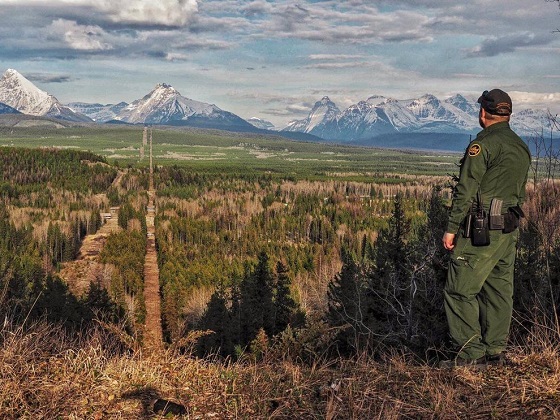
A Border Patrol agent standing watch at the Montana-Canada border in the CBP Spokane Sector. The Spokane Sector covers the U.S.-Canada border along the northwestern section of Montana, part of Idaho, and the eastern part of Washington.
From The Center Square
Lack of operational control at northern border poses national security threats
The northern border largely has been unmanned and understaffed for decades as federal reports issue conflicting conclusions about how much, or how little, operational control exists.
Some officials have suggested the U.S. Department of Homeland Security has just 1% operational control over the northern border after a 2019 General Accounting Office audit of U.S. Customs and Border northern border operations. But a December 2022 DHS report claimed, “The Border Patrol is better staffed today than at any time in its 87-year history,” noting no surveillance of extensive parts of the northern border existed prior to 9/11.
After 9/11, several federal agencies were combined to fall under the newly created Department of Homeland Security. Within 20 years, roughly 950 miles along the U.S.-Canada border from Washington to Minnesota, and roughly 200 miles along the northern border in New York and Lake Ontario, were under unmanned aircraft surveillance. None of these areas “were covered prior to the creation of DHS,” DHS says, meaning the northern border was largely unprotected since Border Patrol’s founding in 1924.
In 2012, DHS released its first unified department strategy for U.S.-Canada border security, prioritizing “deterring and preventing terrorism and smuggling, trafficking, and illegal immigration; safeguarding and encouraging the efficient flow of lawful trade, travel, and immigration; and, ensuring community resiliency before, during, and after terrorist attacks and other disasters.”
Within 10 years at the northern border, more than 2,200 Border Patrol agents were stationed between ports of entry; nearly 3,700 CBP officers were stationed at ports of entry; more than 35 land ports of entry were modernized; and thermal camera systems, mobile and remote video surveillance systems had been deployed.
Havre Sector Border Patrol agent patrolling northern border on an ATV. The Havre Sector covers the U.S.-Canada border along most of Montana’s northern border, and includes part of Idaho and all of Wyoming, Colorado and Utah.
Despite these improvements, “the northern border is under-resourced by far compared to the southwest border,” former Border Patrol chief Mark Morgan told The Center Square. “But at the same time, it still represents significant threats. Cartels are expanding their operations, flying people into Canada, which doesn’t require a visa, presenting an opportunity for terrorist watch-listed individuals to exploit. It’s much easier to get to Canada to come across.”
“Data from 39 months shows terrorist watch-listed individuals are coming here every day and they aren’t stopping,” Morgan added.
For years and prior to the current border crisis, there weren’t enough personnel to cover all shifts, and the infrastructure, technology and equipment afforded to them didn’t compare to those at the southwest border, he said. People can easily drive snow mobiles over frozen territory or boats across the Great Lakes in areas that are unmanned, Morgan said, with a previous policy of self-reporting to authorities.
“The northern border represents a threat,” Morgan said. Noting it only took 19 men to carry out the 9/11 terrorist attacks, Morgan has warned that a terrorist threat is already in the U.S. No one knows how many terrorist watch-listed individuals have illegally entered who weren’t caught, multiple officials have told The Center Square.
While much attention has focused on the southwest border, the greatest number of known or suspected terrorists to ever be apprehended in U.S. history were at the northern border in fiscal 2023, breaking fiscal 2022’s record, The Center Square first reported.
This fiscal year through April, the greatest number of KSTs (known or suspected terrorists) continue to be apprehended at the northern border, 143 so far, according to CBP data.
Potential terrorist threats are not new and have persisted for some time, federal reports indicate. One Border Patrol intelligence report says terrorist threats potentially come from “foreign violent extremists to exploit established alien smuggling routes and networks for the purpose of evading detection en route to the United States.”
Other threats include drug smuggling from Canada into the U.S., connected to “criminal groups with known ties to or hired by Mexican drug trafficking organizations” and human smuggling. In the last few years, human smuggling attempts and apprehensions have significantly increased, The Center Square has reported.
The Center Square first began reporting on northern border national security threats several years ago. Since then, apprehensions of illegal border crossers in the first six months of fiscal 2024 were the highest on record. In the busiest sector of Swanton, Border Patrol agents recently apprehended more people in one week than they did in all of fiscal 2021.
Last month, they apprehended more than 1,400 illegal border crossers, more than they did in fiscal years 2021 and 2022 combined, Swanton Sector Chief Border Patrol Agent Robert Garcia just announced, saying it was “another record-breaking milestone in northern border history.”
This is after they apprehended more than 6,700 in fiscal 2023, more than the apprehensions of the previous 11 years combined, The Center Square first reported.
The U.S.-Canada border is the longest international border in the world of 5,525 miles. Unlike the U.S.-Mexico border, there are no border walls or similar barriers along the U.S.-Canada border. Through DHS, CBP officers are tasked with border security at ports of entry and Border Patrol agents between ports of entry along 4,000 miles. The U.S. Coast Guard, working with CBP’s Air and Maritime Operations, covers maritime security.
espionage
EXCLUSIVE: House Committee To Investigate Spike In Chinese Illegal Immigration Following DCNF Report
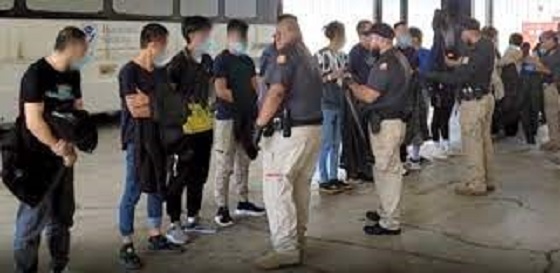
 From the Daily Caller News Foundation
From the Daily Caller News Foundation
Dan Bishop, chair of the subcommittee on Oversight, Investigations, and Accountability, told the DCNF that a “wide-open border presents a ripe opportunity for the [Chinese Communist Party] to undermine our national security.”
A House committee is scheduled to examine the historic surge in Chinese illegal immigration next week, the Daily Caller News Foundation has learned.
The House Homeland Security Committee’s Subcommittee on Oversight, Investigations, and Accountability will hold a hearing on Thursday concerning the roughly 8,000% increase in Chinese illegal immigration the U.S. has experienced since March 2021, a committee spokesperson told the DCNF. The DCNF recently revealed an internal U.S. Customs and Border Protection (CBP) email showing that the Biden administration dramatically simplified the vetting process for Chinese illegal immigrants in April 2023, which has increased the speed of Chinese illegal immigrants entering the country.
The CBP email directed Border Patrol agents to reduce the 40 questions they were required to ask Chinese illegal immigrants down to just five “basic questions” concerning their “Military Service,” “Universities,” “POB/Region,” “Employment” and “Political Party.”
North Carolina Republican Rep. Dan Bishop, chair of the subcommittee on Oversight, Investigations, and Accountability, told the DCNF that a “wide-open border presents a ripe opportunity for the [Chinese Communist Party] to undermine our national security.”
“This dramatic surge calls for intense scrutiny — especially as Border Patrol agents have been instructed to decrease vetting for Chinese nationals in order to process them into the country faster,” Bishop said. “As the CCP continues its quest for geopolitical dominance and threatens our sovereignty, we must examine the risks presented by releasing ever-increasing numbers of minimally-vetted Chinese nationals into our communities.”
READ the leaked @CBP email obtained by the @DailyCaller showing that the Biden Admin radically simplified the vetting process for Chinese illegal immigrants@DailyCaller pic.twitter.com/06sZK3Kiuz
— Philip Lenczycki 蔡岳 (@LenczyckiPhilip) January 2, 2024
U.S. authorities have encountered 24,376 Chinese nationals at the southwest border in fiscal year 2024 alone, according to the committee. In February 2024, the Republican National Committee adopted a resolution condemning the Biden administration’s immigration policies, citing the national security threat posed by “Chinese military-aged men” entering the country illegally, the DCNF reported.
Ammon Blair, a former Border Patrol agent and Army veteran, told the DCNF that “being a Border Patrol agent during the surge in Chinese illegal aliens felt like confronting a scene from ‘Red Dawn.’”
“Gradually, it appeared that our role was being coerced by current administration policies, from honorably defending our borders to paradoxically laying down a ‘Silk Road’ for our adversaries,” said Blair, who now works as senior fellow for the Texas Public Policy Foundation. “This evolution in policy seems complicit in the CCP invasion and their embedded threats like cyber warfare, drug warfare with Mexican cartel proxies, and economic destabilization.”
The simplification of the vetting process for Chinese illegal immigrants and other Biden administration policies have “created pitch-perfect conditions” for “the infiltration of Chinese agents of espionage,” Todd Bensman, a senior national security fellow at the Center For Immigration Studies, told the DCNF.
“Intelligence community assessments show that China intends to ramp up espionage and political suppression campaigns in the coming years inside the U.S. and will need an expanded labor force for the effort,” said Bensman, who is one of three experts scheduled to testify during Thursday’s hearing.
THREAD@BryanDeanWright kindly had me on his podcast to discuss recent @DailyCaller investigations re: CCP influence operations
PART 1/3 covered:
– leaked @CBP email re: how @POTUS simplified vetting process for 🇨🇳 illegals
🙏PLEASE WATCH & SHARE – THANK YOU!🙏 pic.twitter.com/HreHdynFSD
— Philip Lenczycki 蔡岳 (@LenczyckiPhilip) March 8, 2024
Bensman’s testimony will feature photos of identification cards and passports discarded by Chinese illegal immigrants just after crossing the U.S. southern border, a committee source told the DCNF.
Cory Gautereaux, a small business owner and veteran living near the San Diego border, collected those discarded materials and shared them with Bensman.
Gautereaux told the DCNF that he believes Chinese illegal immigration is a “serious national security threat.”
“If they are discarding their IDs and hiding their identity there is a reason,” Gautereaux said. “Since our elected leaders are reluctant to visit the border, I’ll be glad to physically deliver these items to Washington and testify to what I’ve seen.”
-
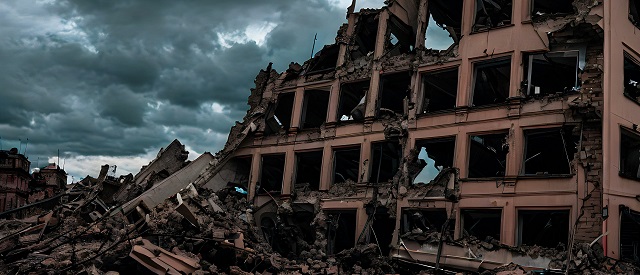
 conflict2 days ago
conflict2 days agoWhite House Reportedly Worried About Russia’s Sudden Momentum Months After Biden Declared Putin ‘Already Lost’ War
-
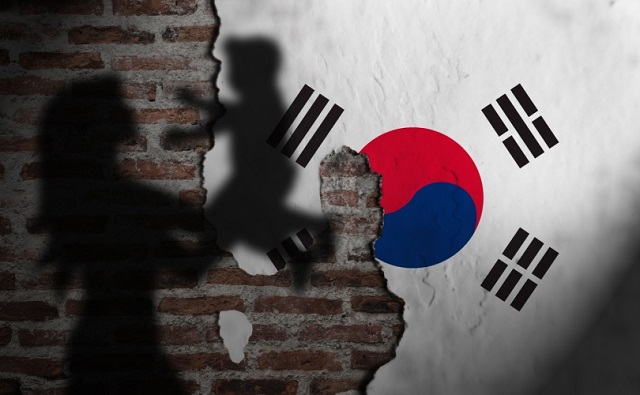
 Health2 days ago
Health2 days agoSouth Korean president declares low birth rate a ‘national emergency,’ plans new ministry to address it
-

 Alberta2 days ago
Alberta2 days agoFortis et Liber: Alberta’s Future in the Canadian Federation
-

 Crime2 days ago
Crime2 days agoSlovakian prime minister who opposed WHO Pandemic Treaty shot in assassination attempt
-

 Crime22 hours ago
Crime22 hours agoThe US Canadian border: Greatest number of terrorist watch list individuals being apprehended at northern border
-

 COVID-191 day ago
COVID-191 day agoNIH Quietly Altered Definition For Gain-Of-Function Research On Its Website, Former Fauci Aide Confirms
-

 Health2 days ago
Health2 days agoUK pediatrician who led review of child ‘transitions’ says US medical groups ‘misleading the public’
-

 COVID-192 days ago
COVID-192 days agoElon Musk-backed doctor critical of COVID response vows appeal after court sides with medical board








